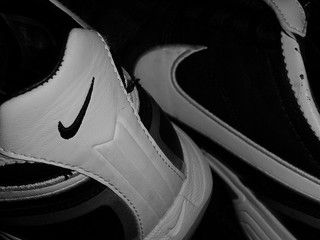
Psychoanalysis
Psychoanalysis in the Age of "Just Do It"
Presidential address to the APA Division 39 Spring Conference in Boston
Posted May 3, 2013

Image: Flickr/eRizer6
This blog curates the voices of the Division of Psychoanalysis (39) of the American Psychological Association. Frank Summers, PhD, ABPP, president of APA Div 39 submits this post, which was the presidential address to the Division's recent Spring Meeting in Boston.
There is perhaps no better index of the values of a culture than its advertising campaigns. What appeals to the populace will be reflected in what messages are effective in selling and consuming its products. One of the most successful modern advertising campaigns is the Nike slogan, “Just Do It.” The spectacular rise in Nike shoe sales from a pedestrian $877,000 per year and second place in 1988 to $9.2 billion and undisputed leader of the running shoe business less than a decade later, an increase of one billion dollars per year, is attributable largely to that ad campaign. Any three words that can play such a major role in raking in more than 8 billion dollars worth of annual sales are worthy of careful reflection.
What is the magical appeal of the slogan? “Do it” would certainly not have much punch, so the magic has to be in the “just.” Because human activity has three dimensions: thought, feeling, and action, the implication of “Just Do It” is that thought and feeling are to be ignored in favor of action. The Nike revolution deletes two of the three spheres of human experience, and judging from shoes sales, little is so irresistible to Americans. Does it seem strange that Americans would be so influenced by the injunctionto neither think nor feel?
The idea of divorcing action from thought and feeling is what the Heidegger scholar, Julian Young, calls “Nikeism,” referring to the culture of “just doing it” as an impatience to act without attending to Being, that is, without any consideration for experience, the human process that may manifest in action. The result is a valorization of certainty in action undeterred by reflective considerations of value or consequence. The more one thinks and feels, the more complex the world becomes, and the less clear is the course of action. Feeling and thought then become devalued as “weakness” as action becomes an end in itself.
The deleterious consequences of the culture of certainty and mindless action have been far more devastating than the everyday hurried, anxious culture it creates. In the run up to the invasion of Iraq, any questioning of military action, any thought given to motive or consequence, was dismissed as “weakness” by the Bush administration, and the military action was supported by the vast majority of the American public. Congress held no hearings, engaged in no serious debate on the wisdom of the policy, before writing a blank check to pursue a military invasion that took more than 100,000 Iraqi and thousands of American lives, and the total cost of which is expected to total more than 6 trillion dollars.
With regard to the invasion of Iraq, a lone voice in the Congressional wilderness belonged to Senator Robert Byrd who said, “To contemplate war is to think about the most horrible of human experiences….Yet this chamber is, for the most part, silent—ominously, dreadfully silent. There is no discussion, no attempt to lay out for the nation the pros and cons of this particular war. There is nothing….The administration has turned the patient art of diplomacy into threats, labeling, and name calling….” To understand such a rush to “just do it” we may consider President Lyndon Johnson’s telling revelation about the America Zeitgeist. He justified sending 600,000 troops to another pointless war when he said, “The American people will forgive you anything but weakness,” he said, as he sent ever more troops into a war that cost more than two million Vietnamese and Cambodian lives, so he could look “strong” (Dean, 2001).
My purpose here is of course is not to revisit arguments about the Iraq War, but to illuminate some of the cultural values that facilitated the rush into one of the worst foreign policy disasters in American history. That Nikeism is a peculiarly American phenomenon is shown in various arenas. For example, in foreign policy Robert Kagan (2002) notes that Europeans are given to patience and diplomacy, while Americans, eschewing the nuances of diplomatic subtlety, prefer action, which is equated with strength.
In the psychological world, we have the experience of no less a luminary than Jean Piaget, the famous Swiss developmental psychologist, who was stunned that Americans would typically ask of any developmental phenomenon, “Can it be done faster?” Piaget and his colleagues, who could not understand why anyone would want to speed up the developmental process, dubbed this inquiry, “The American Question.” “The Hurried Child” (Elkin, 1988) is an American phenomenon, and Nike has now added a slogan: “Fast is Faster.”
Now there cannot be a more antithetical position to Nikeism than the psychoanalytic stance. The essence of an analytic approach to anything, whether clinical or applied, is to contemplate meaning and motivation. We want to know: “Why would you do that? What meaning might that have? How is it that is the best action you can take at that moment?” These analytic questions are precisely the wrenches thrown into immediate action disdained by the Nikeist culture. In fact, on a daily basis, I hear from at least one patient, and frequently more, “I just have to….” All clinicians can fill in the blanks. “I just have to… be more assertive, not let things bother me, learn how to be close, concentrate more, set aside time to do my homework, not care what others think, organize myself better, learn how to take risks, allow my self to be vulnerable, ….” The list is infinite, and the message is clear: the “just” means no inquiry nor reflection is necessary. With annoying frequency I find myself saying to my patients, “I agree except for the just.” In saying this, I am presenting my patient with an alternative worldview: She is saying there is nothing to be understood, and I am contending that there is a layer, or layers of meaning here that prevent the patient from taking the desired action.
The analytic stance and Nikeism stand in stark opposition, and to see who is more popular one need only contrast Nike’s undisputed perch at the top of the shoe sales pyramid with the paucity of clinical psychology programs offering any meaningful representation of psychoanalytic ideas. As analysts we do not “Just do it” nor are we “faster;” in fact, little is slower than a psychoanalysis. The essence of analysis is not quick action, but the use of affective and cognitive depth to initiate meaningful action. Psychoanalysis is a rare contra-position to Nikeism, and the Nike slogan exhorts op-position to psychoanalytic thinking. Akin to Heidegger’s call to listen to Being, psychoanalysis is likewise a call, a call to listen to oneself, to explore the Being given to us in our experience. Where Nikeism says ignore the world of one’s experience, psychoanalysis says that is all we have, the beacon that can be ignored only at our peril. In psychoanalysis, one learns to listen to one’s experience in all its complexity, to explore the thought and feeling as the basis for our very human way of acting.
In essence, then, ours is not only a clinical technique using methods different from our behaviorist colleagues; it is a worldview, a way of seeing and relating to the uniquely human way of being. Taking into account the full dimensionality of thought and feeling as our best guides to action is the psychoanalytic ethos, a positioning that puts its faith in the human subject. Of course, our experience and the motivation on which it is based can always be questioned and changed, but that shift is motivated by new experience. So, as analysts we never leave the domain of thought, feeling, and action which in themselves imply a never ending questioning. By engaging human experience in the deepest, most fundamental way, the psychoanalytic inquiry is an alternative without a conclusion. Where Nikeism demands certainty, we offer a dialogue about the human experience.
Such a worldview sets into question the very assumptions on which the culture of Nikeism is based. In this very real sense, contemporary psychoanalysis is much like a Socratic gadfly, an irritable question mark in a culture of pithy slogans and unexamined calls to action. Annoying the actors, whether patients or public persons, who only want to “just do it” and not be bothered by troublesome questions about what they are doing and why, we are as unpopular as Socrates who was condemned to death for doing what analysts do: Asking questions. Senator Byrd played the Socratic role and got off easy: he was simply ignored. Many who question mindless action are targets of abuse and vilification, as were the opponents of the Iraqi invasion, and as are psychoanalysts. In every questioning, even in a clinical setting, we find ourselves confronting not just an individual person, but also a cultural opposition to our call for an attitude of exploration, a call to refuse immediate action in favor of contemplation and meditated action.
The refusal to endorse Nikeism has led to the frequently levied charge that psychoanalysis is “impractical.” “Practical” in the culture of Nikeism means unmediated action, as we saw in the Iraq War, and we now clearly see in the plundering of the environment for immediate gratification. Every effort to brake such behavior with a plea to consider consequence is dismissed by the Nikeist culture as an impediment to the inexorable progress of technology and production. It should be lost on none of us that the same charge was made in opposition to child labor laws. Who would argue today that the prohibition on child labor is “impractical”? In the Nikeist culture whatever questions the basis of action is “impractical,” even though the “practical” has enveloped the Earth in war, poverty, income inequality, and climate disruption. What is more practical than asking, as Socrates did, how one should live and what sort of culture do we want? Rather than despair, we might well ponder who had the greatest influence on Western Civilization, Socrates or the Greeks who condemned him to death. History has a way of honoring those who stand for the principle of human dignity, as we can see today from the legacy of John Brown, Mahatma Gandhi, Martin Luther King, and Nelson Mandela, as opposed to that of D.F. Malan, Hendrik Verwoerd, and Bull O’Connor.
The basis for our unpopularity is precisely the reason that psychoanalysis is more relevant and crucial to the culture than ever before. At the individual level, we see patients on a daily basis who believe they need to “just do it” and crash against the consequences of mindless action. At the cultural level, we see the disasters of shortsighted policies that seek only to fulfill the need for immediate consumption. There are precious few domains in today’s world ready to oppose such mindlessness by offering the opportunity to engage human experience. The discipline that should be in the forefront of such an opposition, has adopted the “Just Do It” culture in the form of CBT, the therapeutic arm of the “Just Do It” culture. The CBT therapist might be called “the Nikiest therapist.”
Ways of being human, of course, are manifested in a variety of forms: imagination, dreams, aesthetics, passion, love, emotions of elation and deflation, reason, thought, criticism, asking questions, but the culture of Nikeism seeks to silence all but the “doing,” the act without experience that reduces being to mindless behavior. Along with some academics in the humanities, our cultural position stands as a rare advocate for the human experience. It is that voice of the imagination, of questioning why things are constructed as they are, that gives us our unique position in contemporary culture. Our hemlock comes in the form of the dominant behavioral Zeitgeist and the insurance companies it spawned.
Whether the forces that silenced Socrates will likewise silence us depends in part on our willingness to affirm our adherence to the uniquely human experience, whether we see ourselves engaged in a conflict of worldviews, whether we are bold enough to offer a vision of being human. If we so conceive our position vis a vis the dominant culture, we are situated to see our potential value to that same society by offering not only a different form of psychological healing, but also a fundamental alternative to the dominant view of the person. The Nikeist culture has spawned a hunger for someone to listen. We see this everyday in our practices: Patients plead to be heard and are movingly touched just to know someone will listen and make the effort to understand their experience. The generation that has lived through the continually pounding march of a culture with pressure to act and perform screams for someone to hear. And that is why psychoanalysis is more critical now than it ever has been.
History has thrust upon psychoanalysis a task its founders never imagined: advocacy for the uniquely human way of being. At stake is more than our survival as analytic clinicians, but whether we can help keep alive the human spirit, the flame of individual experience in all its depth. The destiny of analysis is to be that Socratic gadfly that poses itself as a question mark and asks, “Why should we just do it?”
---
Frank Summers, Ph.D., ABPP, is President, Division of Psychoanalysis, of the American Psychological Association, Professor of Clinical Psychiatry and the Behavioral Sciences, Feinberg School of Medicine, Northwestern University, Supervising and Training Analyst at the Chicago Institute for Psychoanalysis, and a faculty member of the Chicago Center of Psychoanalysis and three other psychoanalytic institutes.
He is author on three books on object relaitons theory, all published by The Analytic Press:
• Object Relations Theories and Psychopathology: A Comprehensive Text
• Transcending the Self, and Self Creation: Psychoanalytic Therapy
• The Art of the Possible.
His fourth book, The Psychoanalytic Vision, was published in early 2013. Dr. Summers maintains a private practice of psychoanalysis and psychoanalytic psychotherapy in Chicago, Illinois. www.franksummersphd.com



